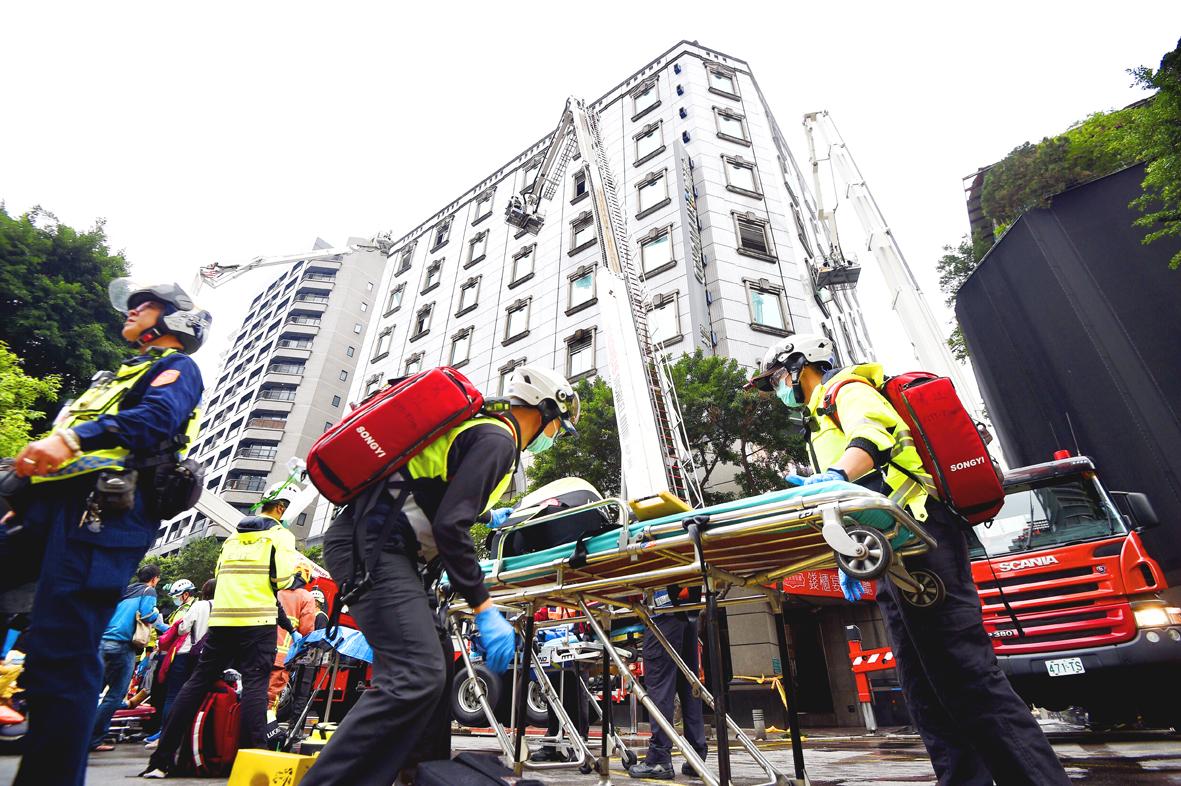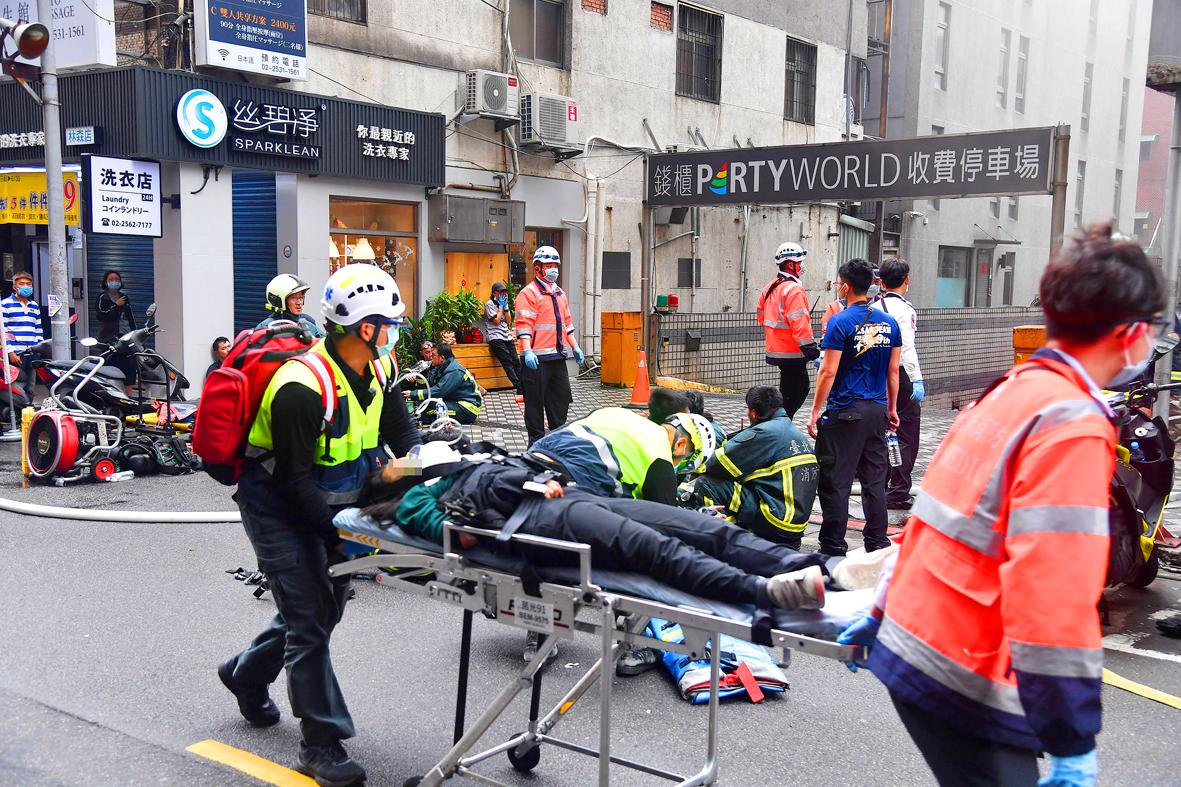A fire broke out at Cashbox Partyworld KTV (錢櫃) on Taipei’s Linsen N Road yesterday morning, leaving five dead and 44 injured, with two more in a critical condition.
The Taipei Fire Department said it received a report about a fire on the fifth floor of a building housing the chain KTV operator at 10:57am and the first fire truck arrived at the site in Zhongshan District (中山) at 11:03am.
The fire was brought under control by 11:28am and was extinguished by 11:30am, it said.

Photo: Peter Lo, Taipei Times
The department dispatched 56 fire trucks, 23 ambulances and 192 personnel, while the New Taipei City Fire Department sent eight fire trucks to assist in firefighting and rescue operations.
Two hundred people had been evacuated and 156 had been rescued from the nine-story building as of 3:30pm, the Taipei Fire Department said.
Fifty-one people were sent to Mackay Memorial Hospital, Shin Kong Wu Ho-Su Memorial Hospital, Chang Gung Memorial Hospital and National Taiwan University Hospital, it said.

Photo: CNA
Seven of them suffered cardiac arrests before arriving at the hospitals, and five were pronounced dead by the hospitals as of 4pm.
Taipei Fire Department disaster and rescue division head Wang Cheng-hsiung (王證雄) said that as the venue was undergoing renovations, only the seventh to ninth floors were operating yesterday, adding that people were rescued from all three floors.
A primary scene investigation found signs of renovation work on the fifth floor, where the fire broke out.
However, the building’s fire alarm, smoke extraction and fire sprinkler systems, as well as smoke alarms and its emergency broadcast system, had been turned off, Wang said.
Having the fire protection systems turned off constitutes serious human negligence, as well as illegal conduct, Wang said, adding that an investigation would determine the cause of the fire and the reason for turning off the systems.
Taipei Deputy Mayor Vivian Huang (黃珊珊), who arrived at the scene at 12:30pm, said the city government has asked its fire, civil affairs and social welfare departments to establish an emergency response task force to assist the victims.
The building late last month reported its own fire safety inspection results, while its fire protection systems and equipment passed the fire department’s inspection on March 31, she said.
The fire department’s investigation section would look into the case to understand whether the blaze was caused by renovation work and why the fire protection systems were not functioning, Huang added.
As Taipei Mayor Ko Wen-je (柯文哲) was in Pingtung County at the time of the blaze, he arrived at the site at about 4pm.
Ko said the cause of the fire would be probed by experts, but the first step is to suspend the building’s operation, cordon it off and preserve evidence on site for the experts to analyze.
Asked at the Central Epidemic Command Center’s news conference whether the fire might have occurred in relation to nightclubs being closed down as part of disease prevention efforts, Deputy Minister of the Interior Chen Tsung-yen (陳宗彥), deputy head of the center, said that the fire was unrelated.
All central and local government agencies take fire safety inspections seriously, which are usually implemented thoroughly, as no government official would want to see public safety accidents occur, but the business owners have to conform to the regulations at all times following inspections, as public safety is no joke, he said.

A Ministry of Foreign Affairs official yesterday said that a delegation that visited China for an APEC meeting did not receive any kind of treatment that downgraded Taiwan’s sovereignty. Department of International Organizations Director-General Jonathan Sun (孫儉元) said that he and a group of ministry officials visited Shenzhen, China, to attend the APEC Informal Senior Officials’ Meeting last month. The trip went “smoothly and safely” for all Taiwanese delegates, as the Chinese side arranged the trip in accordance with long-standing practices, Sun said at the ministry’s weekly briefing. The Taiwanese group did not encounter any political suppression, he said. Sun made the remarks when

The Taiwanese passport ranked 33rd in a global listing of passports by convenience this month, rising three places from last month’s ranking, but matching its position in January last year. The Henley Passport Index, an international ranking of passports by the number of designations its holder can travel to without a visa, showed that the Taiwan passport enables holders to travel to 139 countries and territories without a visa. Singapore’s passport was ranked the most powerful with visa-free access to 192 destinations out of 227, according to the index published on Tuesday by UK-based migration investment consultancy firm Henley and Partners. Japan’s and

BROAD AGREEMENT: The two are nearing a trade deal to reduce Taiwan’s tariff to 15% and a commitment for TSMC to build five more fabs, a ‘New York Times’ report said Taiwan and the US have reached a broad consensus on a trade deal, the Executive Yuan’s Office of Trade Negotiations said yesterday, after a report said that Washington is set to reduce Taiwan’s tariff rate to 15 percent. The New York Times on Monday reported that the two nations are nearing a trade deal to reduce Taiwan’s tariff rate to 15 percent and commit Taiwan Semiconductor Manufacturing Co (TSMC, 台積電) to building at least five more facilities in the US. “The agreement, which has been under negotiation for months, is being legally scrubbed and could be announced this month,” the paper said,

Japan and the Philippines yesterday signed a defense pact that would allow the tax-free provision of ammunition, fuel, food and other necessities when their forces stage joint training to boost deterrence against China’s growing aggression in the region and to bolster their preparation for natural disasters. Japan has faced increasing political, trade and security tensions with China, which was angered by Japanese Prime Minister Sanae Takaichi’s remark that a Chinese attack on Taiwan would be a survival-threatening situation for Japan, triggering a military response. Japan and the Philippines have also had separate territorial conflicts with Beijing in the East and South China